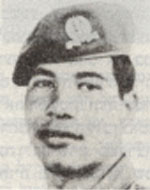Ben-Hamo, Jacques-Jacob
Jacob (Jacques), son of Georgette and Simon, was born on December 20, 1943, in the city of Oran, Algeria. In Oran he graduated from elementary school, and continued to study for two years in high school. Already in his childhood, he longed to immigrate to Israel, joined the Dror-Mahanot Ha’olim youth movement and was an enthusiastic, devoted and always willing to take action. He knew that by joining a pioneering movement in Algiers of those days he was also taking a physical risk, but he was prepared for it. When he was sixteen, he joined the “underground” nucleus and with him moved to France for a period of training in the city of Genot. Although he was the youngest in the group to prepare for kibbutz life in Israel, he was a diligent worker, a cheerful socialite. His spirit never fell upon him, although he was very sorry that his family did not agree to immigrate to Israel with him. In the year 1960, after completing six months of training, he immigrated to Israel and joined Kibbutz Beit Oren in the kibbutz, where Ya’akov went to work in the cowshed and did his work with loyalty and diligence, so devoted to work that by the time one of the great women arrived, Ya’akov was drafted into the IDF in October 1962 and volunteered to serve in the Nahal Brigade with his fellow members of the Nahal Brigade, after which he went on an agricultural training course at Kibbutz Gesher. Jacob was a soldier devoted to his job, persistent in any task he took upon himself and took care to fulfill his duties properly. In mid-April 1965, Yaakov was released from regular service and returned to Kibbutz Beit Oren. Then began the period of uncertainty and confusion. He tried to combine kibbutz life with the duty to a community in which he wished to be a free person. In his spare time, he read and studied – mainly from medical books he had acquired. He turned his room into a laboratory of experiments. “Maybe he dreamed of being a doctor once,” wrote a friend of his. But everything was clouded by the fact that the family, which he loved so much and was connected to with all his sensitive soul, remained far away in exile. He took leave of the kibbutz and went to its home to persuade his family to immigrate to Israel. Although he returned to Israel with a broken Lev for not succeeding in the mission, he did not forget one of his many friends in the economy and brought everyone gifts. His personal distress increased and he decided to try a new way of life – outside the kibbutz. Jacob moved to Dimona and began working at the phosphate factory in Oron. He bought an apartment, which of course was open to any friend and friend, both for a short visit and for a longer stay. In 1967 he participated in the Six-Day War and fought in the ranks of the Paratroopers Brigade that liberated Jerusalem and was awarded the “Six-Day War”. Yaakov went to the Ministry of Labor’s electrical engineering course and completed successfully. He became an independent contractor for electrical work, received large and complex projects and produced good and satisfactory work. When the Yom Kippur War broke out, Jacob made a family visit to France. On the first plane he returned to Israel and immediately reported to the brigade, before he went home to say goodbye to his friends. He fought with the brigade in the bloody battles and incursions against the Egyptians. On the 27th of Tishrei 5734 (23.10.1973), 15 minutes before the cease-fire came into effect, Yaakov was wounded in a fierce shelling south of Ismailia and was killed. He was laid to rest in the military cemetery on Mount Herzl in Jerusalem. Survived by his parents, three sisters and a brother. After his fall, he was promoted to corporal. A tribute to his life and deeds was published in the book “Knights of the Lev,” published by the Paratroopers Brigade, and described in it through the battles that took place until the crossing of the Suez Canal and the occupation of the enclave of the West Bank
